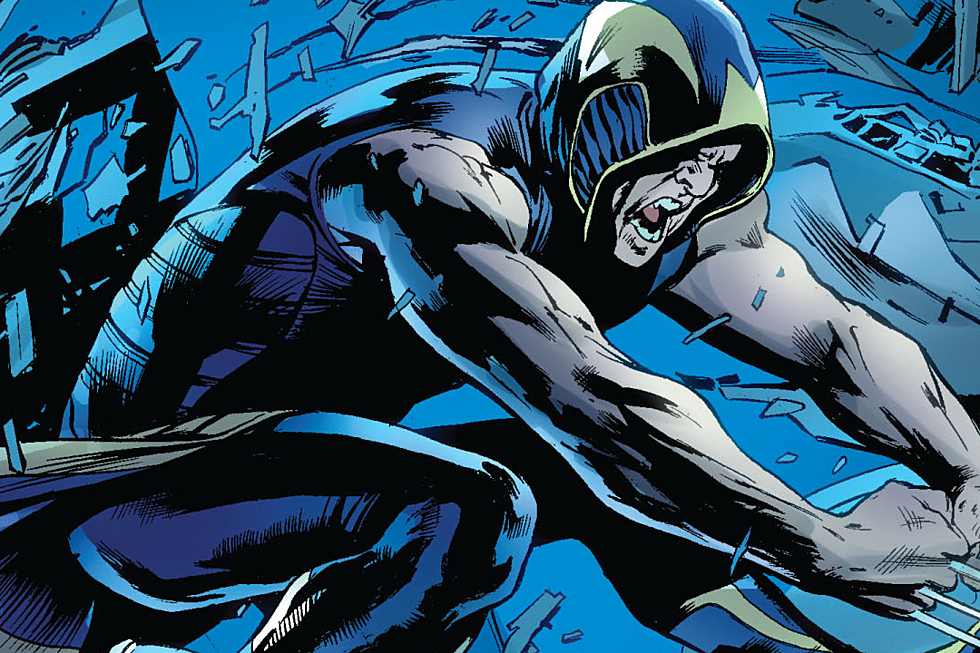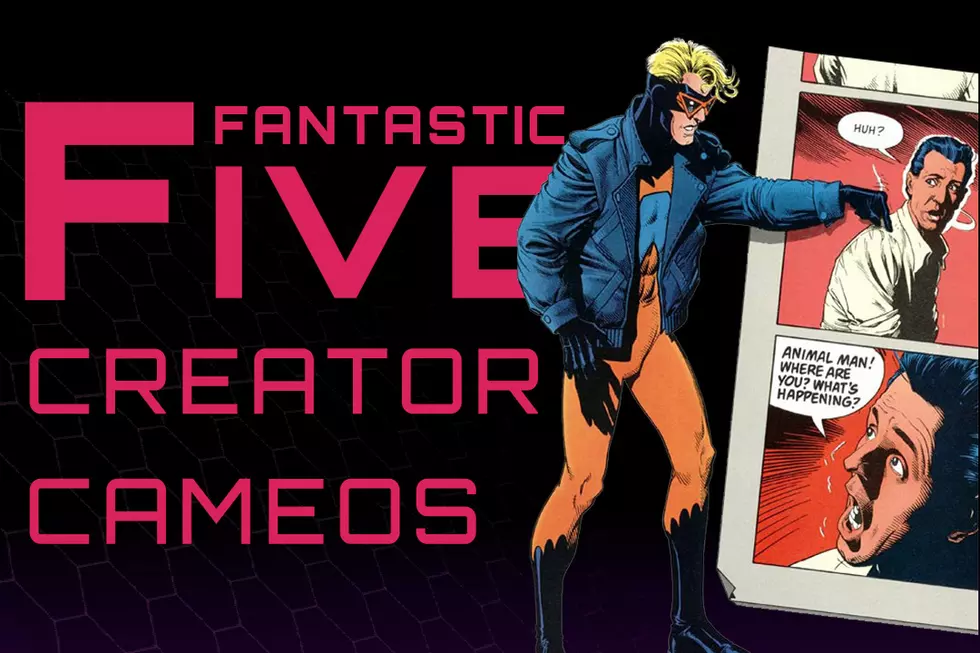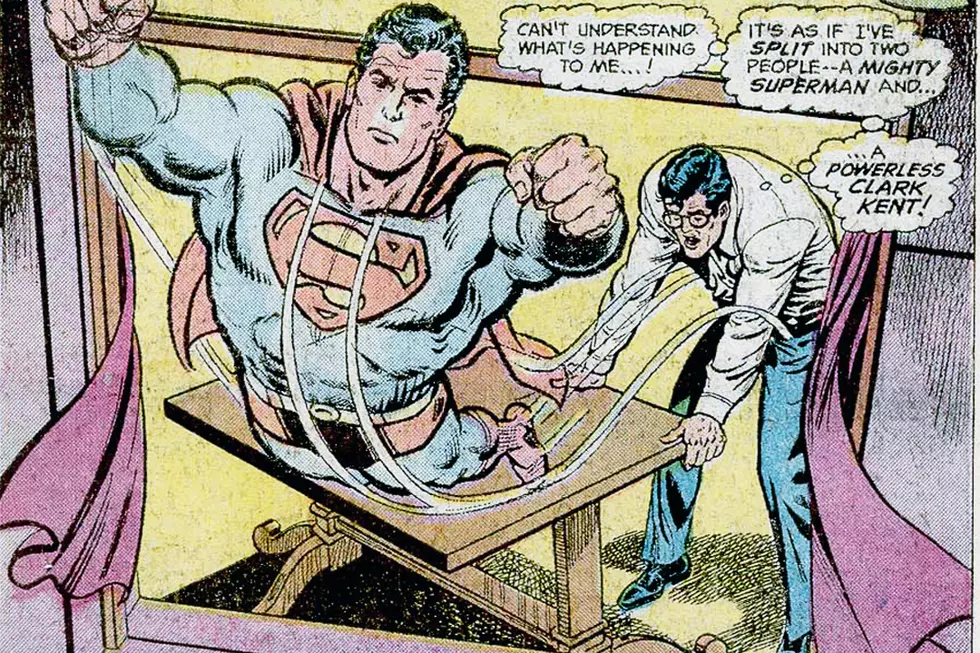
The Evolution of Luthor: Best Lex Luthor Stories by Decade
Many of comics’ most popular heroes have been around for decades, and in the case of the big names from the publisher now known as DC Comics, some have been around for a sizable chunk of a century. As these characters passed through the different historical eras known in comics as the Golden Age (the late 1930s through the early 1950s), the Silver Age (the mid 1950s through the late 1960s), the Bronze Age (the early 1970s through the mid 1980s) and on into modern times, they have experienced considerable changes in tone and portrayal that reflect the zeitgeist of the time.
With this feature we’ll help you navigate the very best stories of DC Comics’ most beloved characters decade by decade. This week, we’re taking a look at the best Lex Luthor comics.
1940s: “Powerstone”
Action Comics vol 1 #47, Superman vol 1 #17, by Jerry Siegel and John Sikela
Lex Luthor was introduced in 1940 as a pulp-inspired mad scientist opponent for Superman, living in a flying city and bringing dinosaurs back to life. The earliest incarnation of Luthor doesn't have a first name, nor does he yet have his trademark bald look. At first, Luthor has a full head of red hair, and it is not until an artist's mistake — presumably confusing Luthor either with the (at the time) more prominent Superman villain Ultra-Humanite or with Luthor's own bald and stocky henchman — that the Luthor we would recognize emerges.
The “Powerstone” saga, the first story to cross over between Action and Superman, sees Luthor go toe to toe physically with Superman after he uses machinery to give himself super-strength and invulnerability. He holds a mansion of millionaires hostage, demanding Superman retrieve for him a Powerstone that would give him abilities surpassing even those of Superman...
The earliest battles of Superman and Luthor can be found in the Superman Chronicles series of books.
Best of the rest: “Europe at War Part II” (Action Comics vol 1 #23), “The Machinations of the Light” (Superman vol 1 #13), “Luthor's Earthquake Machine” (Superman vol 1 #4), “The Battle of the Atoms” (Superman vol 1 #38), “The Man Who Stole the Sun” (Superman vol 1 #48)
1950s: “The Kryptonite Man!”
Action Comics vol 1 #249, by Otto Binder and Al Plastino
As the superhero genre declined in the 1950s, many of the villains from the rogues' galleries of the few superheroes that remained made fewer and fewer appearances. Luthor was not exempt from this trend, either, as he disappeared for much of the middle of the decade in favor of generic gangster or alien plots. But as the Silver Age grew to full bloom in the latter parts of the 1950s, Luthor would make his return, soon to reach new heights in the 1960s.
“The Kryptonite Man” is one of those early Silver Age tales, in which Luthor develops a serum that causes his body to emit green-K radiation and forces Superman to devise a means of getting close enough to stop him.
Luthor's Silver Age appearances can be found in the Showcase Presents Superman series of books.
Best of the rest: “The Titanic Thefts” (Superman vol 1 #90), “Superman's and Batman's Greatest Foes” (World's Finest Comics vol 1 #88), “The Revenge of Luthor” (Action Comics vol 1 #259), “The Terrible Trio” (Superman vol 1 #88), “Superman's Super-Magic Show!” (Action Comics vol 1 #151)
1960s: “The Death of Superman”
Superman vol 1 #149 by Jerry Siegel and Curt Swan
The 1960s was a good decade for Lex Luthor, as you might be able to determine by how full to bursting the honorable mention section for this decade is: he gains a first name, an origin that connects him to Superboy, a family of his own in the form of his sister Lena Thorul (and in 1970, a niece, Nasthalthia), a partner in crime in the form of Brainiac, and a whole planet (with a red sun, naturally) where he can plot against Superman and even finds a wife with whom he has a child.
The selection here, “The Death of Superman,” is an imaginary story (i.e., a non-canonical “what if” type thought experiment), but is likely not only the best example of that sub-genre of story, but probably the best Luthor story of them all. This book-length three-part novel shows the depth of Luthor's enmity for Superman: he hates him so much he would cure cancer just to kill him.
Best of the rest: “The Showdown Between Luthor and Superman!” (Superman vol 1 #164), “Luthor—Super-Hero!” (Superman vol 1 #168), “The Death of Luthor” (Action Comics vol 1 #318-319), “How Luthor Met Superboy!” (Adventure Comics vol 1 #271), “The Army of Living Kryptonite Men!” (Superboy vol 1 #86), “The Face Behind the Lead Mask” (Adventure Comics vol 1 #300), “The Conquest of Superman!” (Action Comics vol 1 #277), “If Luthor Were Superman's Father” (Superman vol 1 #170), “The Triumph of Luthor and Brainiac” (Superman vol 1 #174), “The Team of Luthor and Brainiac” (Superman vol 1 #167), “Lex Luthor Meets the Legion of Super-Heroes” (Adventure Comics vol 1 #325), “The Musical Murder of Superman” (Superman's Girl Friend Lois Lane #64-65)
1970s: “The Luthor Nobody Knows”
Superman vol 1 #292, by Elliot S Maggin and Curt Swan
The 1970s and early 1980s saw a development of Luthor's characterization (and in the early '80s, the addition of his trademark green and purple battlesuit), as he began to be humanized as an intellectual with a devotion to Albert Einstein who might — might — have been an upstanding citizen if it hadn't been for his consuming jealousy and hatred for Superman.
“The Luthor Nobody Knows” is a brief survey of Lex's life, showing the origins of his hatred for first Superboy and then Superman, and the lengths to which he will go to carry out that hatred. This story and a few others from this list are collected in the Superman vs Lex Luthor paperback.
(And! This is the part where I concede that the actual best Lex Luthor story of the 1970s is Elliot S Maggin's novel Last Son of Krypton, but that is disqualified from this list because it is not a comic. Still, you should read it.)
Best of the rest: “You Can Take the Man Out of the Super, But You Can't Take the Super Out of the Boy” (Action Comics vol 1 #466), “The Man Who Murdered the Earth” (Superman vol 1 #248), “The Parasite's Power Play” (Superman vol 1 #286), “Seven-Foot-Tall—And Still Growing!” (Superman vol 1 #302), “The Angel With a Dirty Name” (World's Finest vol 1 #238), “The Frightened Supergirl” (Adventure Comics vol 1 #401)
1980s: “The Secret Revealed”
Superman vol 2 #2, by John Byrne
When DC rebooted its continuity with Crisis on Infinite Earths in 1986, one of the characters who found himself most changed was Lex Luthor. No longer was he a mad scientist who could somehow build robots from inside his prison cell, no longer was he a power-mad genius in a green and purple rocket suit. Now, thanks to a reconceptualization by John Byrne and Marv Wolfman, he was a true villain for the '80s: a greed-is-good billionaire CEO who hated Superman because he didn't trust anyone who couldn't be bought.
“The Secret Revealed” is possibly the best example of this new take on Lex: he goes to extraordinary lengths to discover Superman's secret identity — kidnapping and torturing Lana Lang, ripping out Metallo's kryptonite heart to fashion a ring he can use as a weapon against Superman — before programming his super-computers to calculate it. He doesn't like the results it gives him.
Best of the rest: “Enemy Mine” (Man of Steel #4-5), “The Einstein Connection”/”The Ghost of Superman Future” (Superman vol 1 #416), “Metropolis 900 Mi” (Superman vol 2 #9), Lex Luthor: The Unauthorized Biography, “Luthor Fights for Good!” (Action Comics vol 1 #510-512), “Luthor Unleashed!” (Action Comics vol 1 #544), “Crisis on Three Earths” (DC Comics Presents Annual #1), “Games People Play” (Action Comics vol 1 #600)
1990s: “How Much Can One Man Hate?”
Superman Adventures #27, by Mark Millar and Aluir Amancio
By the early '90s, that kryptonite ring Luthor wore to ward off Superman had given him cancer, and so he faked his death and transplanted his brain into a younger body with a flowing red mullet, Abraham Lincoln beard, and Australian accent, in which he pretended to be his own son, Lex Luthor II.
Which is to say, the best version of Lex from the '90s was the one from Superman: The Animated Series and its comic book adaptation, Superman Adventures, especially the issues by future comics (and movie) superstar Mark Millar.
“How Much Can One Man Hate?” is not only the most Lex-centric issue of the series, but also probably the best. (It's also Chris Sims's pick for best Luthor story, but I still give that one to “Death of Superman,” above.) After Luthor pours his considerable resources into scheme after scheme to destroy Superman, the Man of Steel is forced to demand just what it is that makes Lex hate him so much.
Best of the rest: “Checkmate” (Superman vol 2 #131), “Rock of Ages” (JLA #10-15), Underworld Unleashed #1-3, World's Finest #1-3, Supergirl and Team Luthor #1
2000s: “Lex Luthor: Man of Steel”
Lex Luthor: Man of Steel #1-5, by Brian Azzarello and Lee Bermejo
By the late '90s, Lex was restored to his normal, non-mulleted body and had all his crimes wiped away thanks to a deal with the devil, and even finds himself elected President in the 2000 election. However, after a few years he is ousted from office because his hatred for Superman is too strong, and he soon finds himself wearing a purple and green battlesuit again, mad with power. This period would also see his history as a teen in Smallville with Superboy restored, an element which had been wiped out by Crisis.
Lex Luthor: Man of Steel is a deep dive into the psychology of the post-Crisis Luthor and the way in which he views himself as humanity's savior against an untrustworthy alien invader, beautifully depicted by artist Lee Bermejo.
Best of the rest: “The Gospel According to Lex Luthor” (All-Star Superman #5), Superman: Red Son #1-3, Superman: Lex 2000, “Young Luthor in Smallville” (Superman/Batman Secret Files 2003), “Rain of the Supermen” (52 #35), “Up, Up, and Away!” (Superman vol 1 #650-653, Action Comics vol 1 #837-840)
And that's it for the decades we've experienced so far! The 2010s are halfway over; we'll have to see who comes out on top in five years! Will it be The Black Ring? Let's find out!
More From ComicsAlliance



![Luthor Wants To Be Friends In ‘New Super-Man’ #9 [Exclusive Preview]](http://townsquare.media/site/622/files/2017/03/NSM_Featured.jpg?w=980&q=75)





